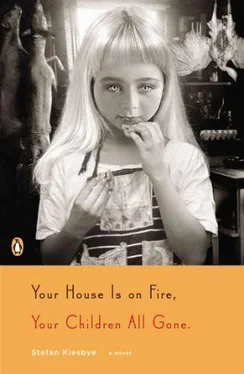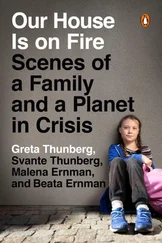The sky was hung with stars, the air, after Rico’s sulfuric tent, dewy and calming. Fall had retained a hint of warmth, and I walked home at a leisurely pace and without any disturbance. Shouting and angry voices came from Frick’s Inn, not unlike the noise that had emanated from Rico’s hell.
I climbed up the lime tree and jumped onto my windowsill. The house was quiet, my parents asleep. My bed was damp and cold to the touch.
They found Ingrid early the next morning, when they tried to wake her for church and couldn’t. For the rest of the day, our house was filled with visitors, mourners, and relatives. I was put in a black suit and wasn’t allowed to leave the house or attend the funeral the following week.
I cannot remember my father’s hands without dirt under his nails. He was a small, wiry man with a shiny scalp that he protected with a handkerchief in the summer. My parents’ marriage was not happy, largely because he never made much money from keeping the grounds at the von Kamphoffs’ manor. Our house was a rickety one-story affair with hardly enough yard space for a few flowers.
“At least they could have put you up at the Big House,” my mother, Therese, said so often that my dad and I would finish that sentence aloud for her. This, I see now, could have been a moment of harmony, one in which he could have acknowledged his shortcomings as a provider, and she her futile aspirations. They could have laughed at themselves. Yet my mom’s face grew so hard at our antics that the lightest touch would have caused it to crack and fall away. It was the end of any conversation, any meal, any warmth.
Of my earliest trips to the Big House, I remember next to nothing, but after I turned four I spent every summer with my father, and every morning I ran along the hedges and bushes and inhaled the strangely heavy scent of the still-closed blossoms. Even though I wasn’t technically allowed to wander the grounds, the von Kamphoffs liked my father well enough not to say a word. They knew that no one else would have done so much work for so little.
When I turned seven, however, I had to braid my hair and attend school, and let Dad do his work without my good cheer and companionship. Instead of lending him a hand, I sat in the classroom, next to my best friend, Anke Hoffmann, and learned how to write and do math. I felt very important with my new books and my large schoolbag, and instead of collecting acorns or raking leaves I spent my afternoons at Anke’s house. I spent so much time with her that I started to feel like a stranger in my own home.
The winter after I started school was no winter at all. In the fall Martin Schürholz had often played with Anke and me, but since our Thanksgiving celebration his visits had become less frequent. When he came to Anke’s room, it was only to braid our hair and put his face in our laps. Or we played wedding, and he was the groom and had to kiss us.
The Vierksen family had been buried on a sunny September day, and at the end of October the sun still made us sweat when we went in our black dresses to Ingrid Bobinski’s funeral. Then the November storms never came, and even on the first Sunday in Advent the windows of our houses were still open and the candles on the pine wreaths put no one in a festive mood. The boys in our village met at night to go swimming in the Droste River.
That December the villagers got quickly used to the warm weather, but when it was almost Christmas and they still hadn’t rummaged through the dark corners of their closets to retrieve their mothballed winter coats, they started to get worried. They enjoyed the mild days and even tolerated the flies, which sat on their doors and windows and crept into their bedrooms and hummed around their sleeping babies, but how long could such a blessing last? Winter had to come after all. It had to snow; the canals had to freeze over. The warmer the days got, the more worried the farmers became. Had Helga Vierksen put a curse on Hemmersmoor? Was it time to pay for our sins? The trees blossomed, grass and grains started to push out of the soil—a sudden frost would cost them their harvest. My father shook his head and sighed. In winter he often came home early; the gardens could do without him. Yet the warm weather would not allow him to rest.
The only woman in the village wearing her black coat was the widow Madelung. She wore black all year, and it was her only coat. Even though the woolen fabric had to be too warm, she wore the coat whenever she left the von Kamphoff manor to walk into the village.
After the last war, the administration in Groß Ostensen had insisted that the von Kamphoff family take in war refugees. This was how Inge Madelung and her young son, Friedrich, came to live in a tiny room at the Big House. She was a small woman, with white, curly hair that, it was said, on the evening before her escape from East Prussia had still been flaxen. Inge Madelung wasn’t yet forty years old, and even though her face looked tired and drawn, she was met with suspicion by the women in Hemmersmoor whenever she came to buy a few things for herself and her son. She didn’t have a husband, she held herself straight, and she had kept her youthful figure.
Hermann Madelung, who had worked as a waiter before the war, had never come home from the Lithuanian front, Mrs. Meier told her patrons. As long as his death wasn’t established, the small woman would not receive a pension. What a cruel fate, sighed Mrs. Meier, and the women in the bakery sighed with her a bit too heartily.
In the summer Inge Madelung worked in the fields around the Big House, and in the fall and winter she did the laundry and helped in the kitchen. She was a good worker, diligent, conscientious, and quiet.
Friedrich grew and started going to school in the village. He was needled because of his mended shirts and socks. He always wore the same pair of pants—clean, mended at the knees, and a bit shabbier every month—until he was finally too tall for them.
Friedrich often bragged about his father, told stories of his daring adventures in the last war. One day his father flew in an attack on Moscow, on another he saved his men by jumping out of a trench and storming toward the enemy all by himself. He’d been a high-ranking officer, Friedrich told us, and had received many medals. Friedrich was the only one in our class whose father wasn’t around, and his stories grew ever more fantastic. But Alex and Bernhard called him a bastard, and he often went home from school crying after fighting with Martin and the others. Rumors were flying that neither Friedrich nor his mother knew who the boy’s father was. She had been too friendly with soldiers or maybe something much worse had happened, something the women in Hemmersmoor never named. They said Inge should be happy that her son didn’t look like a Mongol or a Moor.
Inge Madelung, however, ignored these rumors and mended her son’s pants after every fight. When she came into the village, she held her head high, even though the other women’s hostility was palpable and can’t have escaped her. They worried about their men, called her the Crow behind her back, but loudly enough so she could hear it. She never came to our Thanksgiving celebrations.
No matter how much Inge wished for a friendlier reception in Hemmersmoor, she understood the women’s hostility all too well. She felt the men’s stares like needles on her skin, and was treated without any respect by them, as though she had personally caused her husband’s death.
All that would probably have escaped me—Anke and I had better things to do than to worry about the adults’ affairs—if my father had stayed home like every other winter, if his hedges and flower beds had been buried under a thick layer of snow. But the old owner insisted that my dad work long hours in the gardens of the Big House, and the strangest thing was that it didn’t seem to bother my father. Quite the opposite. Each morning he seemed to get up a little bit earlier than the previous one, and my mother started to complain about his early rising, his good spirits, and loud voice. When my father returned home in the evenings, she was in such a foul mood that I left the house to make Christmas decorations from colored paper and straw with Anke.
Читать дальше












